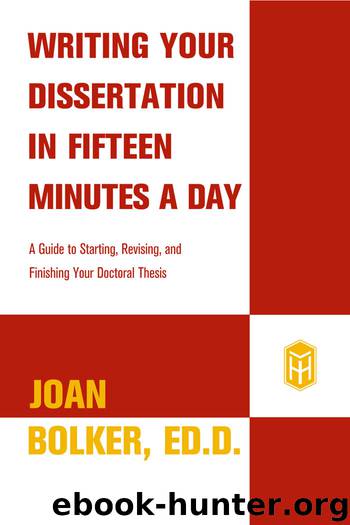Writing Your Dissertation in Fifteen Minutes a Day by Joan Bolker

Author:Joan Bolker
Language: eng
Format: epub, mobi
Publisher: An Owl Book Henry Holt and Company
Published: 1998-05-25T16:00:00+00:00
Static
Static is my name for the unrelated thoughts, feelings, and other distractions that pass through your mind while you’re writing or trying to write; it is the mental debris that seems to have little to do with what you’re writing about. When you read novels and are supposedly inside a character’s mind, what you usually see is a neat, single line of thought (Joyce’s Ulysses is one of the wonderful exceptions). If fictional characters aren’t always strictly logical, their thoughts nearly always seem to be connected; you follow them with more or less ease, as you’re meant to. Real thought, though, is much more complicated and chaotic: You may simultaneously consider an abstract idea, remember what you forgot to do before coming to the library, and notice that you’re hungry. Even when you are writing about something that is terribly important to you, your thoughts may frequently wander down many side paths.
Struggling writers complain about getting easily distracted and note that distractions seem more often to come from the inside than from the outside. They tend to speak about this static in moralistic terms: “I shouldn’t be letting my mind wander like this,” or “I’ve got to concentrate better so I can ignore the distractions.” They experience static as disruptive, disorderly, and dismaying, a sign of incipient brain rot. There is an interesting experiment you can try with your own static that may convince you otherwise: instead of trying to push it out of your mind, try writing down whatever is in your head. If you do this over time, you may be surprised to discover that there is indeed a method to your seeming madness: themes that are present in what seemed to be chaos, themes that reappear over and over again.
One very common theme of static concerns unfulfilled obligations, real or imaginary: “I need to call my elderly aunt, right now,” or “I probably ought to be cooking tonight, since my partner has cooked for the whole week,” or “This house looks like a pigsty. I should really take some time off to clean it up.” Some of these thoughts may be about the real toll that writing takes on other parts of your life: you have to lower your housekeeping standards, make fewer phone calls, do less than your share of the household upkeep for a while. But some of the static is about a much deeper part of being a writer: there is something inherently and wonderfully selfish about claiming time for one’s own thoughts and words, about taking them seriously enough to dedicate a major piece of your life to them, and a smaller piece to the needs of others. I’ve written about this in an essay called “A Room of One’s Own Is Not Enough”: “The worry that the creative act of writing, or speaking out, will rupture connectedness is not a fantasy. From the inside we know that our own strong feelings may do just that. We worry that our ‘selfishness’ will be met with hostility from those we care about.
Download
Writing Your Dissertation in Fifteen Minutes a Day by Joan Bolker.mobi
This site does not store any files on its server. We only index and link to content provided by other sites. Please contact the content providers to delete copyright contents if any and email us, we'll remove relevant links or contents immediately.
| ASVAB | GED |
| GRE | NCLEX |
| PRAXIS | SAT |
| See more | Flash Cards |
| Study Guides | Study Skills |
| Workbooks |
Talking to Strangers by Malcolm Gladwell(12065)
The Compound Effect by Darren Hardy(7718)
The Lover by Duras Marguerite(7194)
Wonder by R. J. Palacio(7192)
Tools of Titans by Timothy Ferriss(7079)
The Circle by Dave Eggers(6359)
A Court of Wings and Ruin by Sarah J. Maas(6271)
Kaplan MCAT General Chemistry Review by Kaplan(6147)
Deep Work by Cal Newport(5686)
To All the Boys I've Loved Before by Jenny Han(5267)
Wiseguy by Nicholas Pileggi(4716)
1,001 ASVAB Practice Questions For Dummies by Powers Rod(4118)
The Body: A Guide for Occupants by Bill Bryson(3960)
Barron's AP Biology by Goldberg M.S. Deborah T(3681)
Cracking the GRE Premium Edition with 6 Practice Tests, 2015 (Graduate School Test Preparation) by Princeton Review(3654)
Eat That Frog! by Brian Tracy(3620)
ACT Math For Dummies by Zegarelli Mark(3610)
Pre-Suasion: A Revolutionary Way to Influence and Persuade by Robert Cialdini(3513)
Kaplan MCAT Organic Chemistry Review: Created for MCAT 2015 (Kaplan Test Prep) by Kaplan(3487)
